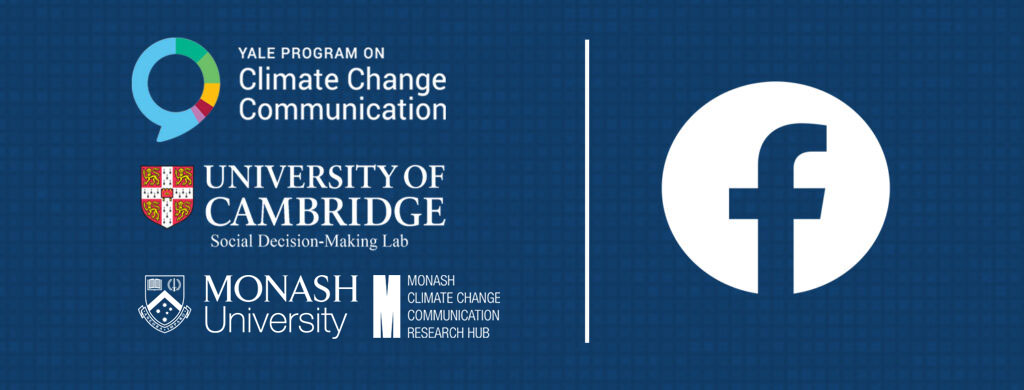Facts About Climate Change
Misinformation about climate change continues to influence many decision makers and members of the public, including misinformation disseminated on social media platforms such as Facebook. To help mitigate this threat, climate communication experts Dr. John Cook (Monash University), Dr. Anthony Leiserowitz (Yale University), and Dr. Sander van der Linden (University of Cambridge) have worked with Facebook to develop evidence-based refutations of climate misinformation on their platform.
In September 2020, Facebook launched the Climate Science Information Center to connect people to factual and up-to-date climate information. The Center features facts, figures and data from the Intergovernmental Panel on Climate Change (IPCC) and their global network of climate science partners such as the UN Environment Programme (UNEP), The National Oceanic and Atmospheric Administration (NOAA), and others.
Globally, nearly 40% or approximately 2 billion adults know little to nothing about climate change — a huge gap in public awareness.Pugliese, A. & Ray, J. (2009) A heated debate: Global attitudes toward climate change. Harvard International Review, 31(3), pp. 64-68. Raising awareness among the global public, and providing basic facts about climate science and solutions, thus remains necessary. At the same time, misinformation about climate change continues to spread both online and offline.
In response, Facebook partnered with experts from Yale, Cambridge, and Monash Universities to launch a new section, “Facts About Climate Change,” on the Climate Science Information Center. This section addresses climate myths commonly found on Facebook, including misconceptions about the existence and causes of global warming, as well as the impact it has on humans and other life on Earth.
The “Facts About Climate Change” section provides people with facts that directly refute these myths, based on current research published by IPCC affiliates including The National Aeronautics and Space Administration (NASA) and The International Energy Agency (IEA). Research has found that direct refutations of climate myths is one important way to combat misinformation. But misinformation about climate change is persistent, prolific, and constantly evolving, so we hope to continue consulting with Facebook and other social media platforms on additional strategies to reduce the influence of climate change misinformation.
About Us
Dr. John Cook at the Monash Climate Change Communication Research Hub has published research and content debunking climate change misinformation, including the Skeptical Science website and developed the Massive Open Online Course Making Sense of Climate Science Denial.
Dr. Sander van der Linden is Director of the Cambridge Social Decision-Making Lab at the University of Cambridge and has conducted research on the psychology of climate change, risk perception, and the communication of scientific consensus. He has also developed online games that teach players how to identify and protect themselves against misinformation.
Dr. Anthony Leiserowitz directs the Yale Program on Climate Change Communication and the climate news and information program Climate Connections at the Yale School of the Environment, where he conducts research in the United States and worldwide on public climate change knowledge, risk perceptions, policy preferences, and behaviors, and the psychological, cultural, and political factors that shape them.
What do you think about climate change? Find out how your beliefs compare to the rest of the U.S. by taking our 1-minute Six Americas quiz.
